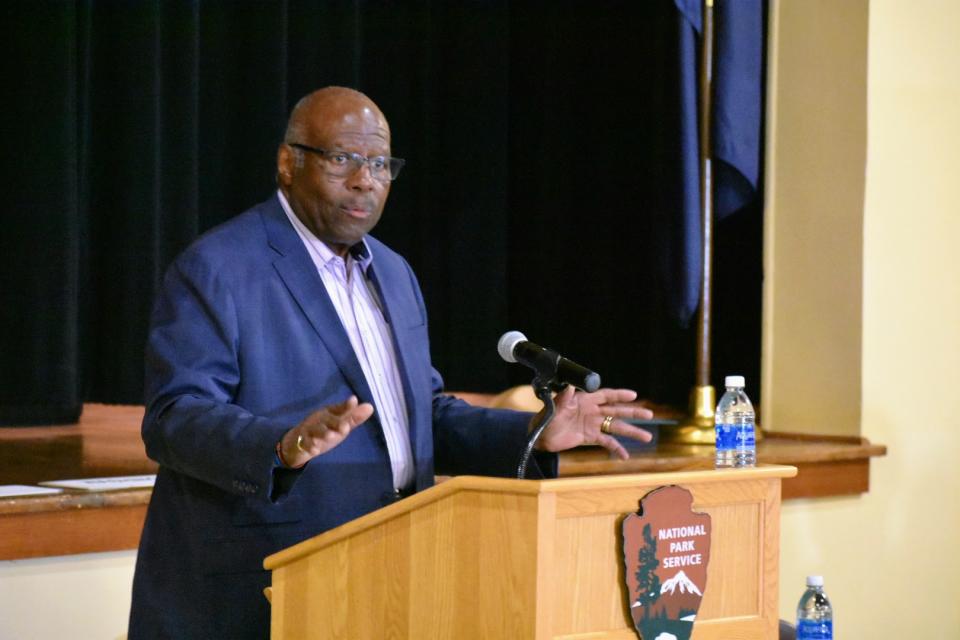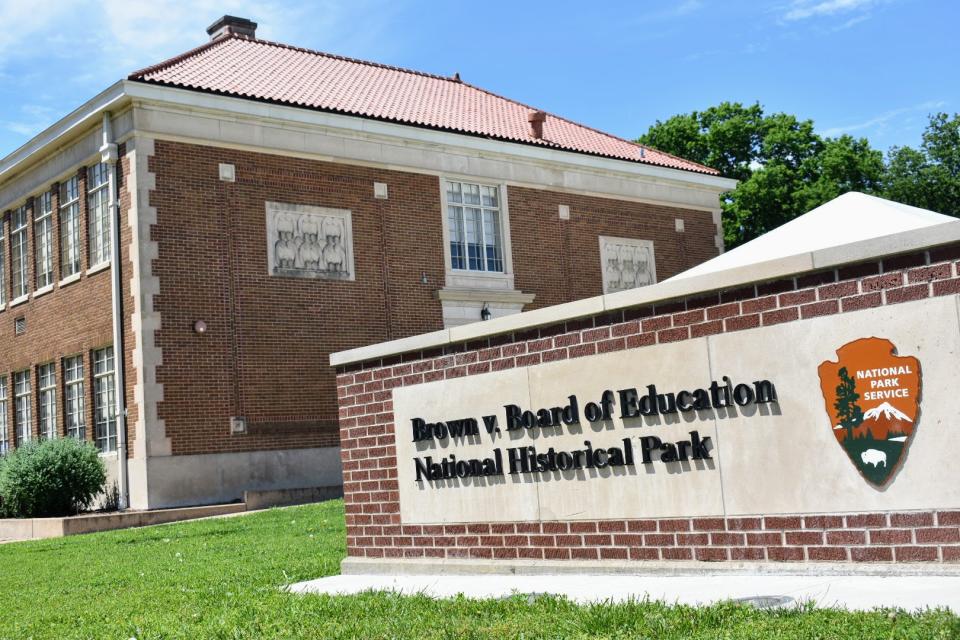People talk May 18, 2024, outside the front gate of the Brown v. Board of Education National Historical Park, formerly Monroe Elementary School. The site hosted a reunion of former students from Topeka’s all-Black elementary schools to celebrate the 70th anniversary of the Brown v. Board of Education Supreme Court decision. (Cuyler Dunn for Kansas Reflector)
TOPEKA — Former students of four all-Black Topeka schools gathered Saturday to remember the teachers, peers and families that shaped their lives — and how their schools helped shape the nation’s education system.
The Brown v. Board of Education National Historical Park at the former all-Black Monroe Elementary school hosted more than a hundred people Saturday. They celebrated the 70th anniversary of the Brown v. Board of Education U.S. Supreme Court case and reunited students from Buchanan, McKinley, Monroe and Washington elementary schools.
The landmark 1954 decision unanimously declared state laws establishing separate public schools for Black and white students to be unconstitutional. The consolidated court case was brought before the U.S. Supreme Court by the NAACP on behalf of Oliver Brown, a parent whose daughter, Linda Brown, was denied entrance to an all-white school in Topeka.
“Those are your stories. Each one of you is captured in that statement,” said park superintendent Jim Williams. “The civil rights story of struggle, perseverance and activism.”
The role Topeka played in the movement to end school segregation was critical, former students said Saturday. The quality of Topeka’s all-Black schools caught the eye of the NAACP as they took on segregation. Despite the high-quality education at Topeka’s all-Black schools, segregation itself still placed Black students as inferior.
A panel featuring former students from all four all-Black Topeka schools shared in a group discussion about their experiences.
Whether it was Ms. Williams’ loud shoes or Ms. Bradshaw’s stingy grades, people nodded and cheered as the panel mentioned their old teachers and friends.
“I love them so dearly that their names stuck with me,” said Darlene Jackson, who attended Buchanan Elementary School.
The panelists made it clear their education was not substandard. Many of them said they had a worse experience after they were moved to the formerly all-white schools. Many of them wondered why the white students didn’t come to their schools instead.
The racism and segregation they experienced didn’t end after the Brown v. Board of Education decision. But they were taught by the teachers at their all-Black schools how to deal with and keep fighting hate.
Many of those same teachers lost their jobs as the all-Black schools were closed.
“In every movement, there’s always a sacrifice, something has to be sacrificed,” said Rosetta West, who attended Buchanan Elementary School. “I am who I am today because of what I learned. And that gave me the drive to push, to go ahead and do something different. It was up to us as students to make that sacrifice worth it.”
The event’s keynote speaker was the Rev. Joseph B. Anderson, who attended Washington Elementary School. He also attended the U.S. Military Academy at West Point and served in Vietnam.
He said his upbringing in Topeka, specifically the teachers and role models he met at Washington Elementary, helped prepare him for his future in the military.
Of his 900-member class at West Point, Anderson said only six students were Black. He had no Black teachers or officers. But growing up in Topeka helped him learn how to fight the exclusion. He said he may have been one of the first to walk through the door, but he wanted to make sure he wasn’t the last.
“Topeka is a place of racial collegiality and inclusion, as opposed to a place of animosity and exclusion,” Anderson said. “I look upon all of us here today and appreciate what these four Black grade schools have done for us, to make us who we are, making a difference in what we do. Topeka is my home.”
Marty Patterson in 2018 won the National Park Service’s Enduring Service Volunteer Award for her work at the Brown v. Board of Education site. At Saturday’s event, she was recognized for the honor.
“This is a work of love because this is my hometown,” she said. “We had no complaint for education, but the problem was did we have equal access? And that’s what they could fight for. They needed Topeka.”
The post Brown v. Board at 70: Students from Topeka’s all-Black schools recall how segregation shaped lives appeared first on Kansas Reflector.
Signup bonus from







